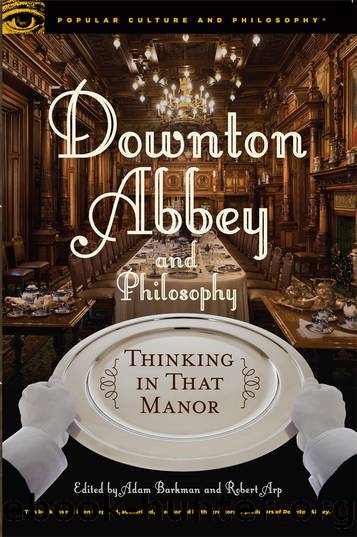Downton Abbey and Philosophy by Adam Barkman

Author:Adam Barkman
Language: eng
Format: epub
ISBN: 9780812699128
Publisher: Open Court
Published: 2015-09-11T00:00:00+00:00
14
Things Can Happen That Nobody Could Imagine Only a Few Years Ago
DONNA MARIE SMITH
I feel a shaking of the ground I stand on. The nature of life is not permanent but flux. Things are changing.
âMR. CARSON (5:1)
An âunsinkableâ ship sank. A Great War was fought in which millions died. A global influenza pandemic killed many more millions. An array of technological innovations changed the way people communicated, traveled, and worked. During the period from 1912 to 1919, the world fell apart, and life would never be the same, especially in Europe where monarchies fell, country boundaries were re-drawn, and financial hardships altered the structures of economies and social classes. The modernist ideas, culture, and technology that dawned in the late nineteenth century took hold in the aftermath of World War I, ushering the world into the dazzling daylight of the 1920s. Set amidst this sweeping historical backdrop, the British drama Downton Abbey has captivated audiences with its engrossing story about the lives of the Crawleys and the hard-working servants who help run their grand Yorkshire estate in the north of England.
If German philosopher Georg Hegel (1770â1831) were following the daily lives of the Crawleys, he would find woven into the narrative tapestry the opposing forces of tradition and progress, conservatism and liberalism, and Victorian and Edwardian morés and modern Jazz-Age values. He would see Lord Grantham and his daughter Mary struggling as they forgo some of their aristocratic ways in order to maintain Downton as a working estate and fulfill their duty as employers for their county. He would take note as Carson the butler, Mrs. Patmore the cook, and the Dowager Countess overcome their anxieties brought about by using the new-fangled technologies that have invaded their world. Meanwhile, he would observe that Matthew Crawley, Lady Sybil, and Tom Branson have learned to embrace new ways of thinking in order to find their self-worth and help build a better world. Hegelâs philosophyâas grand and intricate as the fictional world of Downton Abbey created by Julian Fellowesâreveals that it is this conflict, this struggle between the old ways and new ideas, that has led people like those in Downton Abbey to improve themselves and the world in which they live.
Change Is Coming, but I Still Want My Cup of Tea
In his Philosophy of History, Hegel writes, âThe history of the world is none other than the progress of the consciousness of freedom.â At the heart of the tension between tradition and progress in Downton Abbey is the survival of the way of life of the Crawley family and the estate on which they live. Tradition has kept the estate going for many generations, but it is progress that keeps it going through the transformative years of the early twentieth century. The ideas of tradition and progress are more than age-old customs and laws and new-fangled ideas and technology.
When we first enter the world of Downton Abbey, we step into a place that seems both distant and familiar to us. It is
Download
This site does not store any files on its server. We only index and link to content provided by other sites. Please contact the content providers to delete copyright contents if any and email us, we'll remove relevant links or contents immediately.
Lois & Clark: A Superman Novel by C. J. Cherryh(755)
Film Studies: An Introduction (Film and Culture Series) by Ed Sikov(690)
Cinematography: Theory and Practice by Brown Blain;(624)
The Making of Star Wars (Enhanced Edition) by Rinzler J. W(581)
On directing film by Mamet David(574)
Film Studies by Ed Sikov(548)
Digital Compositing for Film and Video by Steve Wright(535)
True Blue by David Baldacci(517)
Baldacci, David - True Blue by Baldacci David(511)
Modern Nature by Derek Jarman(489)
Hitchcock by Rothman William(488)
Free Play: Improvisation in Life and Art by Stephen Nachmanovitch(471)
Film Lighting by Kris Malkiewicz(460)
The Men who Made the Movies by Schickel Richard(439)
When I Stop Talking, You'll Know I'm Dead: Useful Stories From a Persuasive Man by Jerry Weintraub(428)
iMovie: The Missing Manual by David Pogue and Aaron Miller(392)
The After Effects Illusionist by Perkins Chad(373)
Four Screenplays by Syd Field(373)
After Effects Apprentice, by Meyer Chris Meyer Trish(344)
